When Daredevil debuted on Netflix in April 2015, it set the geek world afire. Having already conquered movie theaters with the various members of the Avengers, the Marvel Cinematic Universe was now taking its more ground-level heroes and trying to do the same on streaming television.
While it started out fantastic—with the first seasons of DD, Jessica Jones, and Luke Cage in particular achieving greatness on multiple levels—it petered out pretty quickly. Part of it was some weaker entrants (Iron Fist season one), part of it was sophomore seasons unable to live up to their debuts (DD and JJ’s second seasons were both steps downward), and a huge part of it was Netflix losing interest in partnering with Marvel once Disney announced their own streaming service. As a result, The Punisher season two and Jessica Jones season three were released this year with minimal fanfare or buzz, feeling for all the world like Netflix was releasing them solely to fulfill contracts.
With the third season of JJ bringing this corner of the MCU to a close, let’s take a look back at the baker’s dozen of seasons we got out of it.
SPOILERS FOR ALL THIRTEEN SEASONS OF MARVEL’S NETFLIX SERIES BELOW!
Daredevil season one
April 2015
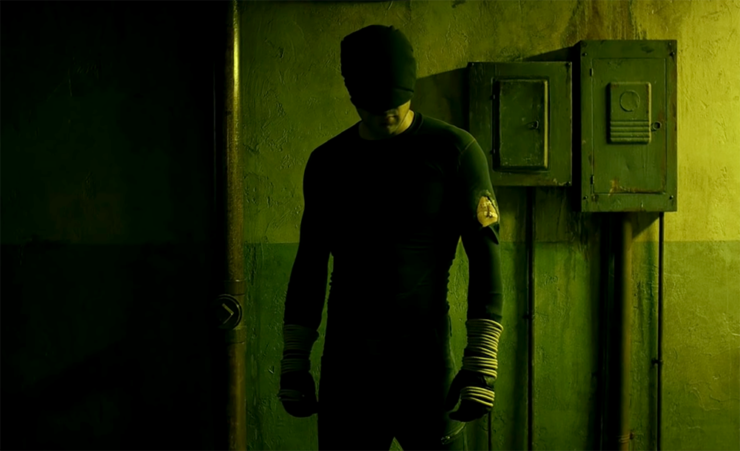
(Reviewed on this site by Emmet Asher-Perrin)
The Good: Almost all of it. Brilliant introduction to the milieu, making excellent use of Daredevil’s long history as well as that of the MCU. One of DD’s iconic runs was the “Born Again” storyline by Frank Miller and David Mazzucchelli and its aftermath by Ann Nocenti and John Romita Jr., when DD was the protector of Hell’s Kitchen through the late 1980s. The problem is that that neighborhood has gentrified in the three decades since, so portraying it as a slum in the 21st century is problematic—but hey, we’ve got the Chitauri invasion in Avengers, which took place in midtown! Problem solved! Now Hell’s Kitchen is back to being a slum thanks to superheroic property damage, and Wilson Fisk leads a consortium of real-estate developers looking to make several different types of killing.
Every bit of casting is spot on here, from Charlie Cox’s intense Matt Murdock, to Elden Henson’s snarky Foggy Nelson, to Deborah Ann Woll’s complex Karen Page, to Bob Gunton’s steady Leland Owlsley.
But the standouts are Wai Ching Ho, who has overwhelming presence as Madame Gao (that we never got a proper Madame Gao storyline is one of the greatest losses of the Netflix series coming to an end), Rosario Dawson, debuting the part of Claire Temple, the glue that will hold this corner of the MCU together in its early days, and especially the brilliant Vincent d’Onofrio as Wilson Fisk, who makes the Kingpin of Crime a tragic, complex figure.
The Bad: The people writing this series are very obviously completely ignorant about how being a lawyer works and how being a reporter works. This is a problem insofar as the main characters are lawyers, and journalism plays a major role in the storyline.
The Ugly: Killing Ben Urich. All the points scored by the color-blind casting of Vondie-Curtis Hall as Urich—who was just amazing in the part—were taken away by killing him off for no compellingly good reason.
Jessica Jones season one
November 2015
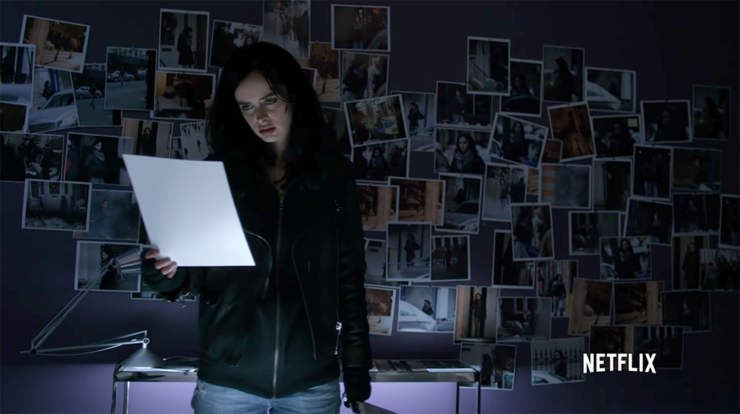
(Reviewed on this site by Tansy Rayner Roberts)
The Good: Everything. Seriously, this is about as flawless a season of television as you’ll find anywhere. It’s a brilliant examination of gaslighting and sexual harassment, of rape culture, of empowerment, and of addiction in general and alcoholism in particular. Krysten Ritter was born to play Brian Michael Bendis and Michael Gaydos’s creation, Rachael Taylor is brilliant as Trish (her character also serves as a superb study of parental psychological abuse), Mike Colter gives us a smoldering, intense Luke Cage, and David Tennant gives the greatest performance of his career to date (caveat: I’ve not yet watched Good Omens) as Kilgrave.
The Bad: For the second season in a row we get a sympathic African-American character killed off for no compellingly good reason. Both Ben Urich’s death in DD season one and especially the death of Detective Clemons, played by the great Clarke Peters, in this season are gratuitous as hell, and given the dearth of black characters, is a really bad look.
The Ugly: Not really this season’s fault, but so brilliant a debut is a really tough act to follow…
Daredevil season two
March 2016
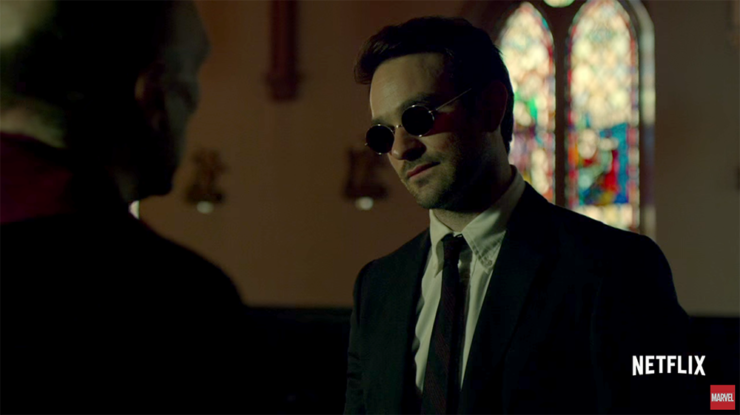
(Reviewed on this site by Tansy Rayner Roberts)
The Good: The introduction of the Punisher is magnificently handled—so much so that Netflix amended their plans in order to add a spinoff series starring Frank Castle to the slate, which lasted two seasons. A brilliant look at DD’s influence on the people of New York, and a really good study of vigilantism, with a level of depth that the cinematic versions—who only tell two-to-three-hour stories at a time—don’t really have time to get into.
The Bad: While Elodie Yung is perfect as Elektra and Scott Glenn even more so as Stick, this half of the plot falls down in every way. In 1982 when Frank Miller and Klaus Janson introduced ninjas and their version of Asian mysticism into Daredevil, it had a tinge of the exotic about it, and it was something new. Thirty-five years later, it’s tired and not that interesting, and is just a lot of sound and fury signifying very little.
The Ugly: One of the best things about season one was the dynamic among Matt, Foggy, and Karen. So why spend the second season with the three of them separated most of the time? To make matters worse, their portrayal of Karen’s reporter career is, um, not what journalism is like…
Luke Cage season one
September 2016
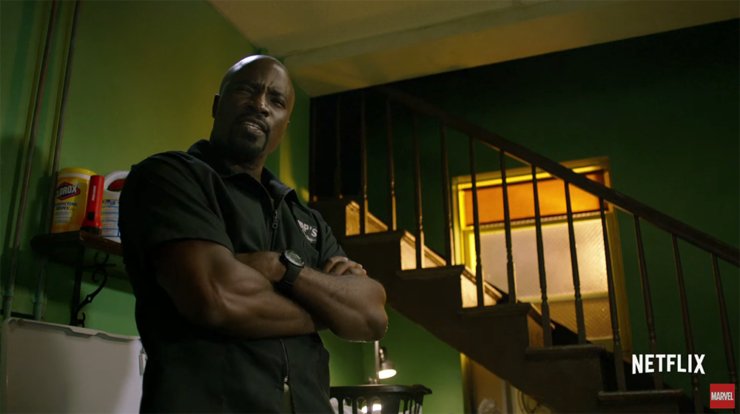
(Reviewed on this site by Monique Jones)
The Good: This show embraced Harlem the way The Wire embraced Baltimore, the way Republic of Doyle embraced Newfoundland, the way Bloodline embraced the Keys. The show had a great energy, a stellar use of music, and a phenomenal lead in Mike Colter. One of the things I like about Colter’s Cage is that he’s the only one of the Netflix heroes with a purity of purpose. (Well, okay, Frank Castle does, too, but that’s an impure purity, as it were.) The others are all either reluctant or have too much baggage, but Cage just antes up and kicks in and helps the people of Harlem.
On top of that, Alfre Woodard, Theo Rossi, and especially the brilliant Mahershala Ali are phenomenal as the bad guys, and Simone Missick just nails Misty Knight.
The Bad: Both this season and Jessica Jones season one hint at a larger story behind the experiment that resulted in Cage’s powers, but it never comes together very well. And, like many of the Netflix series, the third quarter, as it were, is slow-moving and weak.
The Ugly: Killing Ali’s Cottonmouth and replacing him with Erik LaRay Harvey’s significantly less interesting Diamondback was just a wrong move on every conceivable level. Cottonmouth was a brilliant villain—choosing a best villain among him, Tennant’s Kilgrave and d’Onofrio’s Kingpin is a challenge—and killing him also did a lot to kill interest in the series.
Iron Fist season one
March 2017
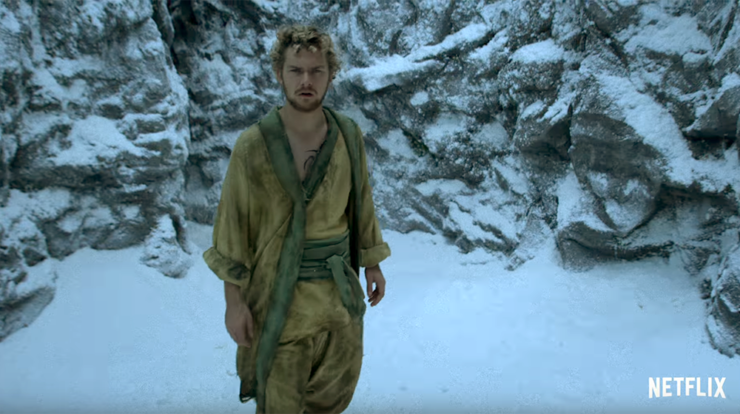
(Reviewed on this site by Keith R.A. DeCandido)
The Good: Jessica Henwick is superlative as Colleen Wing, as she has a great journey to go on, and Henwick plays her beautifully, realizing that she’s on the wrong side and working to fix it. Her early experimenting with MMA fighting is a bit of a weird detour, as it doesn’t actually go anywhere, but she’s otherwise amazing. Excellent work here also by Tom Pelphrey as Ward, Jessica Stroup as Joy, and Sacha Dhawan as Davos.
The Bad: I really don’t see how anyone could look at four decades of Iron Fist in the comics and conclude that the first season of his TV show should feel like an episode of Suits instead of an episode of Into the Badlands. Rand Meacham was always a minor background element of the comics, yet Rand Enterprises is the major driving force of the TV show, at the expense of K’un-L’un, which we see almost nothing of. Also David Wenham is awful, failing to make Harold Meacham compelling in any way.
The Ugly: Utterly disastrous casting of the lead, as Finn Jones a) has no martial arts skills whatsoever and b) is terrible. In a cinematic/TV universe that has given us great fight choreography with Captain America, the Black Widow, Daredevil, Black Panther, and Melinda May, to see the inept, incompetent fight choreography in the one that’s about a friggin martial artist is just depressing as all heck. Just as the Daredevil writers know nothing about lawyers or reporters in their story about lawyers and reporters, Iron Fist‘s scribes know nothing about martial arts or corporations in their story about a martial artist getting involved with a corporation. Unlike DD, though, the IF writers don’t give us a good story to ameliorate it.
The Defenders season one
August 2017
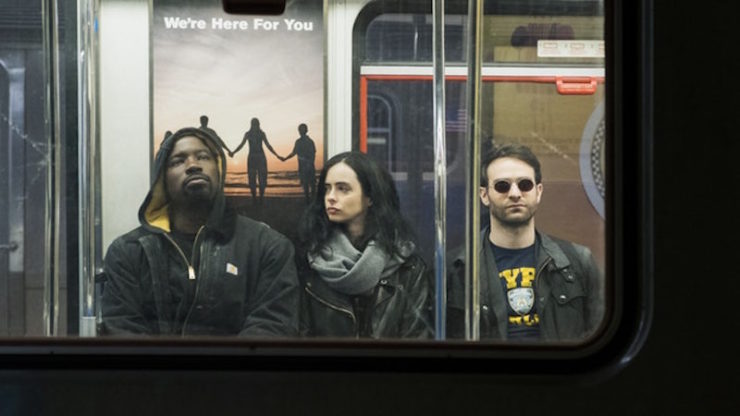
(Reviewed on this site by Keith R.A. DeCandido)
The Good: Brings in threads from all the previous seasons—plot stuff from Iron Fist and Daredevil, character stuff from all four shows—elegantly and intelligently. Keeps everyone in character while moving forward with the story. After a long progression of villains who are charismatic but tend toward explosive anger (Kingpin, Kilgrave, Cottonmouth, Mariah Dillard, Harold Meacham), Sigourney Weaver’s calm and serene Alexandra is a welcome change.
Also points for taking the disparate and seemingly contradictory bits of the Hand we’d seen on Daredevil and Iron Fist and making them actually make sense.
The Bad: The show doesn’t embrace New York the way the others do, a particular problem given that they’re trying to save the city. And just in general, the sense of urgency and danger is never entirely present, especially since the threat is, um, the bad guys have to take bones out of a hole. Oooh, scary….
The Ugly: Just as with Luke Cage season one, the bad guy is killed off prematurely and replaced with someone less interesting. Elodie Yung’s Elektra is great as a foil for Murdock, less so as a big bad endangering the city. (Madame Gao even points out how absurd it is for her to just take over Alexandra’s role when Alexandra had such a huge infrastructure in place, but the story then ignores that.)
The Punisher season one
November 2017
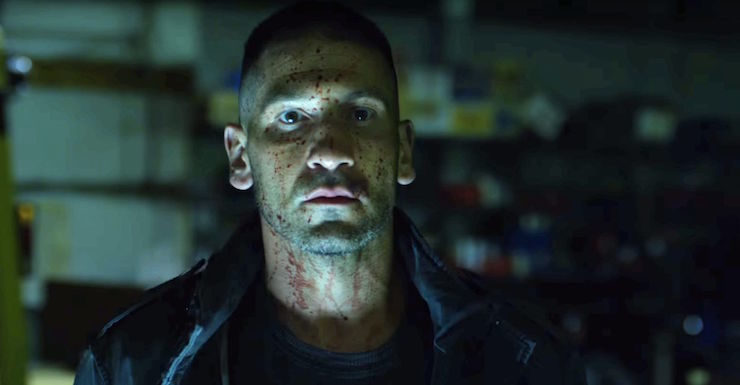
(Reviewed on this site by Keith R.A. DeCandido)
The Good: Jon Bernthal’s superlative performance in DD season two is brought into the lead role here, and he’s amazing, giving us a nuanced, complex Punisher. In particular, this series examines Frank Castle’s military background, which is usually only backstory in the comics. This entire season is a strong meditation on PTSD.
The Bad: After having his entire story arc set up at the end of DD season two—getting revenge on the people responsible for killing his family—they then dispense with that in the very first episode before the credits run, so they can instead do a story…
…where he gets revenge on the people responsible for killing his family. Okay, then.
The Ugly: Despite the fact that Castle was inspired by Daredevil, despite the presence of Karen Page (and other characters from the Netflix MCU), this series goes out of its way to pretend it doesn’t take place in a world of superheroes. This is especially problematic with the arguments about taking the law into your own hands, which would be very different in the MCU. It’s a blown opportunity.
Jessica Jones season two
March 2018
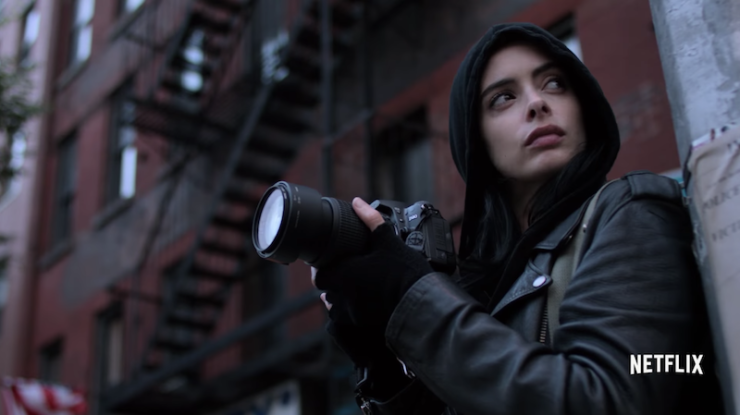
(Reviewed on this site by Tansy Rayner Roberts)
The Good: Does a fantastic job exploring more of the youth of both Jessica and Trish, with phenomenal performances by Krysten Ritter and Rachael Taylor, who knock it out of the park all season long. It’s as strong a meditation on addiction as Punisher season one’s was on PTSD, with all the characters being addicts to some degree or other. It’s also especially impressive to see Rebecca DeMornay’s Dorthy Walker doing as good a job of gaslighting and manipulating Trish as Kilgrave did Jessica last season, only Dorothy doesn’t even have super-powers.
Also Janet McTeer—whom I had the pleasure of seeing on stage in 2016 as Petruchio in an all-female production of The Taming of the Shrew—is superb as Jessica’s mother.
The Bad: This isn’t that bad, but the show suffers from comparison to the first season. I think it was a wise choice to have a less focused season without a single big bad—it’s more fitting for JJ’s noir tone in any case—and instead a bunch of small villains. But it doesn’t help that one of those small bads, Pryce Chang, is an idiot. (A waste of the great Terry Chen, that.)
The Ugly: Like Punisher, this show refuses to acknowledge its place as part of a larger universe—especially frustrating given that Luke Cage was introduced on this show. The back half of this season is all about how Jessica is the only one who can stop her mother and, well, she’s not. She’s got a bunch of new powered buddies! Why aren’t they at least mentioned?
Luke Cage season two
June 2018
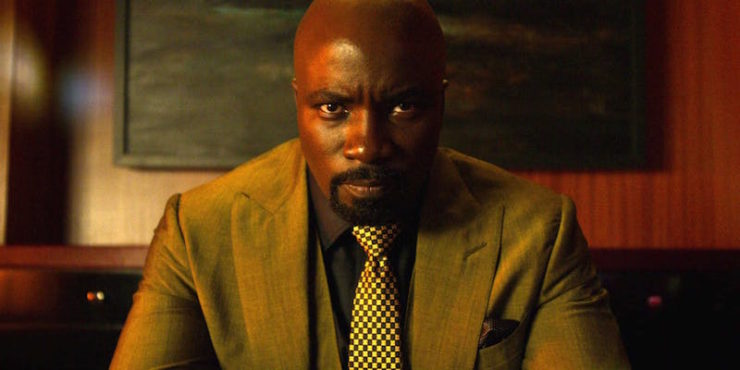
(Reviewed on this site by Keith R.A. DeCandido)
The Good: Everything. Second only to JJ season one in its excellent mix of pace, characterization, and compelling bad guy. Watching Cage’s progression from can-do-no-wrong hero to being beaten by Bushmaster (played with verve and tremendous charisma and physicality by Mustafa Shakir) to eventually being posthumously manipulated by Mariah Dillard into taking over Harlem’s Paradise is magnificent, and the season gives us tons of room for character development of Cage, Shades, Comanche, the Dillard family, Bushmaster, and Misty Knight. On top of that, we get actual use of the expanded universe, as Jessica Henwick, Finn Jones, and Elden Henson all put in strong appearances as Colleen Wing, Danny Rand, and Foggy Nelson, respectively, all to good effect.
And then we have Reg E. Cathey—in unfortunately one of his final roles before his death—being his usual brilliant self as Cage’s Dad.
The Bad: The writing sometimes suffers from a bit too much repetition—there are several occasions where characters have the same conversation over and over again. Also, they can’t come up with a good reason for Danny Rand to not be around after his one-episode appearance beyond “we only contracted you for the one episode, Finn, sorry.”
The Ugly: The third season was in the midst of being developed when Netflix cancelled this series that was so incredibly popular that its first season shut down Netflix for a while because so many people wanted to watch it. I can live with the other series ending where they did, as they all at least came to a decent conclusion. Cage though was a) demonstrably popular (Netflix may not release actual viewership numbers, but, again, Cage friggin broke Netflix) and b) left hanging on a serious cliffhanger. That we’re not getting a third season is malpractice of the highest order.
Iron Fist season two
September 2018
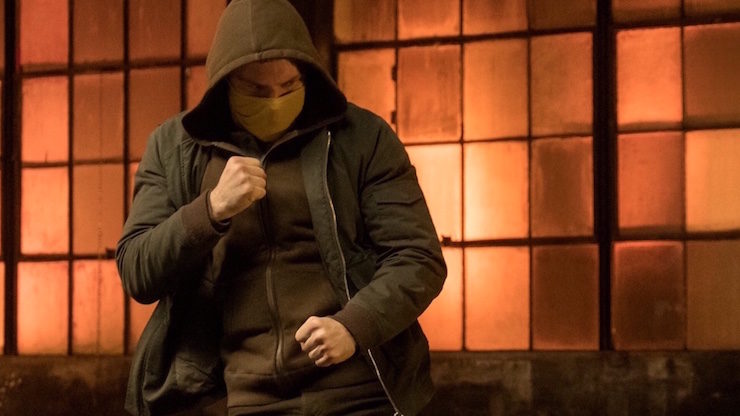
(Reviewed on this site by Keith R.A. DeCandido)
The Good: This is part Iron Fist season two and part the backdoor pilot for a Daughters of the Dragon series that, sadly, we will never see. Misty Knight and Colleen Wing are long-established partners in the comics, and—after being teased with it in The Defenders and Luke Cage—we finally get that team-up in this season, and Simone Missick and Jessica Henwick are amazing.
We also finally get a look at K’un-L’un in flashback—it’s not enough, but it’s something, and it’s also some of the best stuff in the series. And there’s only one scene in Rand and it’s Ward leaving! The only focus there is on the surviving Meacham family, which is played brilliantly by Tom Pelphrey and Jessica Stroup.
The Bad: Finn Jones is still awful. He’s better in this season than he was in The Defenders, which was, in turn, better than he was in season one, but he’s still very much not good. Also, as good as Alice Eve is as Mary Walker, the character just feels like she wandered in from another show and doesn’t seem to serve much purpose.
The Ugly: Sacha Dhawan—after being one of the best things about season one—is a total, one-dimensional disaster as the big bad of season two.
Daredevil season three
October 2018
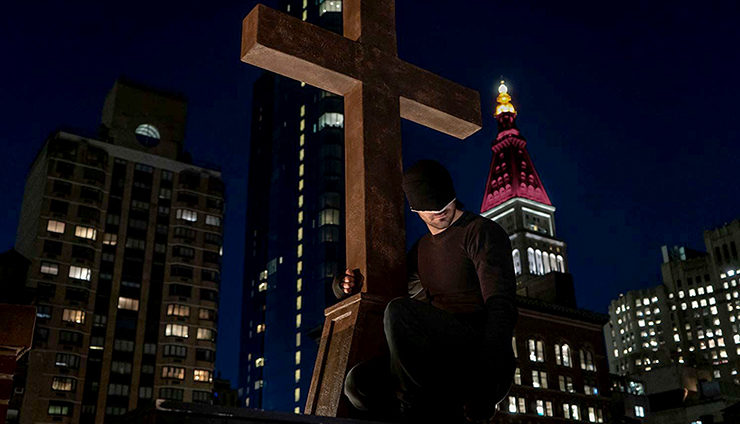
(Reviewed on this site by Leah Schnelbach)
The Good: This is a decent adaptation of the “Born Again” storyline from the comics, complete with the introduction of Sister Maggie, played with verve and panache by Joanne Whalley. After keeping Matt, Foggy, and Karen separate for season two to ill effect, they’re back together as a team again here, and it’s glorious. And Vincent d’Onofrio is never not amazing.
The Bad: Once again, we get a season that refuses to acknowledge its place as part of a larger set of stories. At no point after he comes back from the seeming dead does Murdock contact the other Defenders, even though he asked them to guard the city after he was gone. At no point does he ask any of them for help. Worse, at no point after DD is declared public enemy #1 after being framed by Bullseye do any of those heroes show up to try to stop him. (It would’ve been so cool to see Jessica Henwick with her shiny new iron-fist-powered sword go after Murdock.) And when Fisk invites the criminal bigwigs of the city to his wedding, where’s Cage?
The Ugly: I didn’t buy for a single solitary second that the Wilson Fisk that we first met in season one of DD was this all-powerful crime boss with tons of federal law-enforcement personnel in his pocket. It’s the problem with adapting comics with so much history—when you do it right, you distill five decades of stories into a single storyline; when you do it wrong, you compress five decades of stories into a single storyline. Season three of DD is the latter, sadly. The Kingpin of the “Born Again” comics story had been around for ages, first as a Spider-Man villain, then as a Daredevil villain. But the Kingpin of Netflix has only been around for six-and-a-half seconds, and the corrupt real-estate mogul of season one is incompatible with the Kingpin of Crime of season three.
The Punisher season two
January 2019
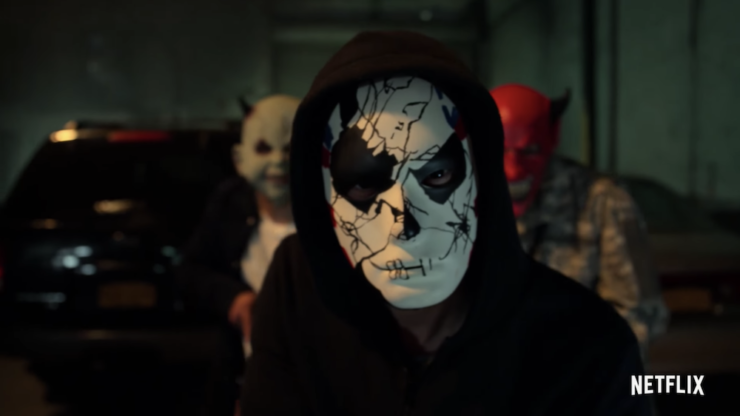
(Reviewed on this site by Keith R.A. DeCandido)
The Good: Jon Bernthal remains excellent, having a strong, relaxed chemistry with everyone he stands next to, from his doomed relationship with Alexa Davalos’s Beth to his weird mentor relationship with Giorgia Whigham’s Amy/Rachel to his military bond with Jason R. Moore’s Curtis to his consistent great relationship with Deborah Ann Woll’s Karen. And he’s surrounded by an excellent cast—besides those listed above, there’s Amber Rose Revah’s superb Madani, Royce Johnson continuing his recurring role as Detective Mahoney, Cecilia Antoinette’s snarky bank manager, and the fantastic Joe Holt and Brandon Gill as the sheriff and deputy who defend Castle and Amy from a siege.
The Bad: Again, no acknowledgment of the larger universe they’re in, which is particularly frustrating when Castle comes back to town and there’s no response from any of the other New York heroes. Even leaving that aside, Mahoney’s experiences with corrupt feds in DD season three should’ve come up in his dealings with Madani.
The Ugly: The pacing is a disaster, the story is all over the place, and the two plot threads have nothing to do with each other. Each one intrudes on the other to ill effect. Plus, while Ben Barnes was a great Russo in season one, he’s a dreadful Jigsaw in season two, especially since he’s not nearly as scarred as the script says he is, plus his plot-convenient amnesia is utterly unconvincing and cheap.
Jessica Jones season three
June 2019
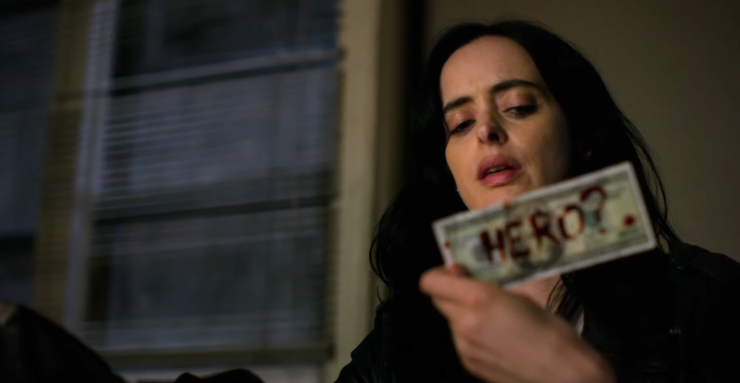
The Good: The first season was about sexual assault, the second season was about addiction, and the third season is about heroism. Trish’s attempt at it—as she finally becomes Hellcat, though she’s never named that (except in the title of one episode)—in particular shows how blurry the line is between hero and villain and how easy it is to go too far.
As an added bonus, the final episode gives us a Luke Cage cameo, and Mike Colter’s presence is extremely happy-making—though it’s a bit bitter, knowing that his planned third season will never be.
The Bad: At no point during the references to Trish—called, simply, “the masked vigilante”—does anyone ever mention Daredevil (who’s been protecting Hell’s Kitchen, and who also was believed to be a murderer in his recent third season) or Iron Fist (either Danny Rand or Colleen Wing, both of whom have been active in Chinatown) or Cage (at least until the last episode) or the Punisher (who also has killed while wearing a costume) or, for that matter, Spider-Man or the Avengers. It’s maddening, and it makes a lot of the moralizing about super-powered heroism feel incomplete.
The Ugly: After establishing itself as the place for strong villains—Fisk, Kilgrave, Cottonmouth, Mariah, Alexandra, Madame Gao, Bushmaster—the Marvel Netflix series ends with the lamest, most stultifying villain ever. The notion of an incredibly smart normal person who ticks all the MRE/incel boxes has potential, but as written and as boringly played by Jeremy Bobb, Gregory Sallinger is a low-watt disaster. What’s especially frustrating is the number of stupid mistakes he makes, which belie someone who has managed to keep eight murders hidden.
The Netflix corner of the MCU was a maddening mix of brilliant and frustrating, some great performances and superlative villains mixed with inconsistent plotting and severe pacing issues. Both The Defenders season one and Iron Fist season two had fewer than thirteen episodes, and they both benefitted from it, and the other series might have taken a chapter from that. Hell, dividing The Punisher season two into separate, shorter seasons would’ve done both the Russo and Pilgrim storylines a world of good—ditto Daredevil season two with the Punisher and Elektra plots.
To me, what was most frustrating is that, while Daredevil, The Punisher, and Jessica Jones all had a certain strong finality to them, both Luke Cage and Iron Fist left their sophomore seasons with fascinating promise for future storylines (Rand and Ward in Asia exploring the iron fist, Colleen Wing fighting in NYC with here iron-fist-powered katana, the promise of the Daughters of the Dragon, Cage trying to keep Harlem safe while trying to not be lured to the dark side), and that we won’t get to see that is supremely maddening.
Hilariously, one of the things that makes the movie side of the MCU so powerful is that Kevin Feige has adopted the television model for producing movies, but the actual TV shows haven’t done what Feige and his gaggle of writers and directors have managed, which is embrace the continuity. So much of the texture of The Punisher‘s two seasons, of Daredevil‘s third and Jessica Jones‘s second and third seasons would’ve been improved by more cross-pollination, even if it was just ideas and mentions, not necessarily guest appearances. The continuity provided by Rosario Dawson’s Claire Temple in the early days was sorely missed in the latter days.
Still, these were worthy TV shows (well, except Iron Fist) and deserved to continue (even Iron Fist). It’s a true shame that we won’t get more.
Keith R.A. DeCandido has been rewatching every single live-action movie based on a superhero comic book each Friday here on Tor.com, and has also written about Star Trek, Stargate, Batman, Doctor Who, and (now for the last time) the Marvel Netflix series, and much more here since 2011. His latest novels are A Furnace Sealed, an urban fantasy set in the Bronx, Mermaid Precinct, the fifth novel in his fantasy police procedural series, and Alien: Isolation, based on the classic movie series and the hit videogame. He also has short stories in the new anthologies Thrilling Adventure Yarns, Footprints in the Stars, and Brave New Girls: Adventures of Gals and Gizmos.










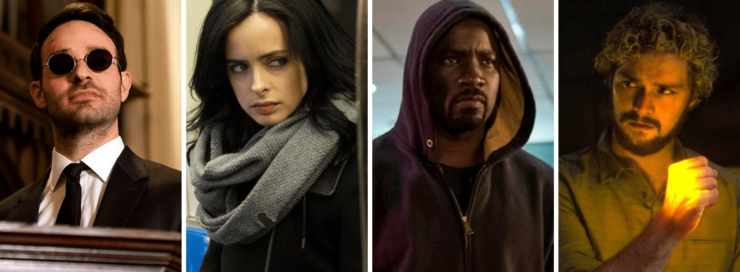
Hmm, let’s see. I thought DD, JJ, and LC had superb first seasons and okay subsequent seasons. I didn’t like LC season 2 compromising Luke’s purity to the extent that it did. I think DD and JJ both rebounded pretty well in their third seasons. As for JJ season 3, I’d argue that the real “Big Bad” of the season was Trish, with the Foolkiller being a red herring much as Alexandra was in The Defenders. After all, the unifying theme of JJ is that all the Big Bads are deeply personal for Jessica — her abductor, her mother, her sister.
IF season 2 was definitely an enormous improvement over season 1, and I agree that we needed a Daughters of the Dragon series. As for The Punisher, though, I feel the reverse. I was uneasy with a Punisher series even existing, but I felt season 1 did a good job of not glorifying his violence, of portraying it as a morally problematical consequence of deep psychological damage and giving Frank an ending that offered some hope that he could leave it behind. Season 2, by contrast, was a gratuitous exercise in hitting the reset button. It largely just rehashed resolved threads from season 1 and pushed Castle back into being a one-note, unchangeable killing machine, and in the end it pretty much did end up glorifying that in just the way I feared. I regret that I even watched season 2. I’m glad that JJ season 3 came after it so that I could end my Marvel Netflix journey someplace more positive.
My votes for the best main title sequences/themes are Jessica Jones at #1 and Luke Cage at #2. The others were more forgettable.
Charlie Cox couldn’t do martial arts when he was cast as Matt Murdock, but they gave the character a mask, let the actor do what he could, brought in a stunt double for the rest, and had a successful season.
For poor Finn Jones, no such considerations were put in place. Not enough stunt doubles. No mask. Terrible choreography. Nowhere near enough rehearsal. Scott Buck was clear in pre-release publicity that he thought Iron Fist’s ability was not very interesting, and he did his best to make that happen in the show.
I feel bad for Finn Jones. When he wasn’t being asked to do stupid stuff, he was believable, charming and likable.
And while I loved Jessica Jones S1, a lot of people seem to overlook its prominent flaws, especially when they compare it to later seasons. The last several episodes were a repetitive mess.
The worst flaw of the Netflix MCU is that the plot is solely motivated by itself. Why did Ben Urich die? Because somebody had to die and it couldn’t be the main characters, no matter how much more sense it would make for Fisk to kill them rather than Urich. Why is the law so poorly understood? Because it needs to be bad for the heroes to take things into their own hands, even though the result is a legal system that makes less sense than adventure games logic. And then there’s the padding for no other reason that there has to be content for 13 episodes. This leads to lots of plot points being just completely forgotten, as they were just diversions just so the season wouldn’t end early.
I disagree about the villain for Jessica Jones season 3 though. As you say, Sallinger had potential, although his whining about his lack of privilege as a highly educated white man is really grating. And had he actually been convincing as an evil mastermind, he could have been interesting. But he’s not the villain: Trish is (in fact, I liked Sallinger better as the guy who keeps pushing his luck making Jessica angry, as he knows she has no choice but to protect him). After season 2, it couldn’t have gone otherwise: all of Trish’s arc in season 2 had been her start of darkness. And here again, it’s a shame that we won’t see her redemption arc.
i never liked daredevil, with that exception great stuff from marvel
First off, thank you Keith for this article. After JJ S3 got absolutely no review/coverage at all on this site, I was wondering if Tor.com had lost interest as much as Netflix had. I’m assuming Tansy Rayner Roberts is either unavailable or uninterested in reviewing Season 3, which is disappointing, as I enjoyed her reviews of S1 and S2 almost as much as I enjoy your articles.
I agree with most of what you wrote – if anything, I might even be MORE frustrated with the lack of a cohesive MCU feeling in these shows than you are. And that’s saying a lot.
The Luke Cage cameo in JJ S3’s finale was nice, and the brevity of it actually made sense, plot-wise. Jessica didn’t need a fellow Defender to help her take down Trish. She just needed to have the strength of will to do the right thing in a very difficult situation. So Luke gave her all of the help he needed to give during that 10 minute scene.
I am similarly disappointed in a lack of Luke Cage Season 3. I’m fine with no Iron Fist Season 3, but it would have been awesome to see a Daughters of the Dragon show instead. Perhaps Disney’s streaming service will pick up these threads (with better casting for Danny Rand if he comes back?) sometime down the road. Unlikely, but hope springs eternal.
Ideally, I’d love to see the Disney streaming service embrace the pre-existing TV shows (or the characters from those shows) and do a show called Marvel Tales or something like that – something a bit like Black Mirror. Each episode could be a contained story, set in the MCU, with different characters that have already been introduced on the big/small screen. Imagine having a Jessica Jones noir story one week, then a Colleen Wing/Misty Knight story the next week. Or an episode where there’s a major earthquake in NYC and we get vignettes from each of the 4 Defenders, with SHIELD showing up at the end to help with cleanup.
I know we’ll get a taste of those sorts of things with Falcon and the Winter Soldier, Loki, and WandaVision – but there’s no need to use ONLY big screen actors/characters.
But I digress. The Netflix MCU shows were welcome TV viewing and were the impetus behind me re-instating my Netflix subscription. But unlike AoS, I don’t find many seasons very re-watchable. I’m sure my opinion that AoS > NetflixMCU is an unpopular one, but there you go.
Final thought – one thing you didn’t really cover in your review is how absolutely dark each season of each show gets. DD S3 in particular was emotionally draining to get through. Each time it seems like there might be a light at the end of the despair-tunnel it turns out to be a train that crashes into the lead characters.
That wasn’t light … it was the C-train
JUNO: 10 points for the appropriate deep-cut reference, but also 10 points off for referencing the Affleck Daredevil movie in any way……..
—Keith R.A. DeCandido
Absolutely, the weakest part of all the series is that they’re not at least internally consistent. Even if the nods to the larger MCU were handwavey at best, they should have been able to refer back & forth to each other. It’s also endemic of having an Iron Fist showrunner uninterested in telling an Iron Fist story.
In an ideal situation, they’d have walked into this having roughed out a ‘Marvel Knights’-esque direction for the shows that would have capped with the Defenders, then had the individual series woven through. Daredevil gets Fisk arrested in DD season 1? Show that the criminal consolidation is still going on in the background in the other shows. Pull most of the Hand work out of Daredevil, let IF do the lifting on that. Jessica Jones & Luke Cage could’ve easily handed the ‘powers from unethical experiment’ baton back & forth.
@2, DD isn’t a martial artist per se, he’s more of a brawler backed up by insane sensory perception and agility.
Punisher season 1 is one of my favorite shows, and not just of the Marvel Netflix. As someone that has suffered some measure of PTSD, it was wonderful to see it portrayed in so many different ways, both positive and negative. Every plot of every episode ties into PTSD, and every character deals with their own versions. Of all the shows, this and the first season of JJ felt the most cohesive. And wholly cow Bernthal was amazing. He brings such an intensity to everything he does.
Punisher S2 wasn’t as tightly woven, but I still quite enjoyed it. Russo’s face definitely needed to be more heavily scarred based on the damage he sustained, but I think they were going more with the psychological scarring, leaving the shattered mask to fill in. Russo felt more scarred than the physical reality.
The first half of Luke Cage S1 was really good, and went downhill as you say once they killed Cottonmouth. The end fight with Diamondback was cringeworthy. While his armor would protect his body, his neck was completely bare, so each time that Cage’s punch to the face didn’t result in a snapped neck, the verisimilitude dropped.
Sad to see them all go, hopefully once the rights revert to Disney we’ll get some revisits to the characters.
Please watch Good Omens as soon as possible. Anything upcoming on the last two MCU TV shows: Agents of Shield and Legion?
@8 I’m relatively positive that Legion isn’t set in the MCU. From what I’ve read (I have admittedly not watched the series) it is, if anything, very loosely set in the X-Men universe alongside X-Men: First Class and such.
@8,9, Legion was originally stated to be part of the X-Men movie universe, but at some point it changed to be stand-alone (still based on X-Men characters/comics but unconnected to the movies). Maybe all of it is taking place inside his mind.
@8/C Oppenheimer & 9/Kalvin: Legion and The Gifted are/were from Fox, under their X-Men license. Each show is in its own self-contained universe that’s a variation on the X-Men continuity; I recall a Fox exec saying that they were basically taking a multiverse approach, but that’s really just a handwave for the fact that they’re doing it like virtually all live-action comics-based TV series other than the MCU and the Arrowverse have always been done, with each show being its own separate thing.
With Marvel Netflix gone, the remaining current TV shows that are (nominally) set in the MCU are Agents of SHIELD, Cloak & Dagger, and Runaways.
Yes, Trish is the true big bad of JJ3, but that doesn’t alter the excessive screen time he got and how badly he was written and performed, which was a major drag on the season….
—Keith R.A. DeCandido
Far back in the dim mists of time, in an age long forgotten, there were television shows that did precisely this. The Bold Ones, The Name of the Game, and The NBC Mystery Movie all did this. I loved those shows.
There was even a show called The Defenders, which starred, amongst others, E G Marshall and William Shatner. It, however, had a fixed cast of characters. It was a courtroom drama and the topics they covered in 1961 seem every bit as relevant and important today as they did then.
Luke Cage s2 gets a lot of hate, but it really is just a great season and didn’t stumble toward the end nearly as much as many of the other MCU shows (and, honestly, Netflix shows in general) seemed to. Bushmaster was a fantastic villain, though it did make me wonder why we had three different villains named after snakes, none of which knew one another. So it’s not like it was planned or anything. Just three people who agreed that they hated Luke Cage, but loved snakes. The end of s2 had such an incredibly compelling setup for a season 3 and I’m honestly crushed that it’ll never happen.
I wish Marvel would reconsider continuing some of these for Disney+ (apparently Ritter is very done with Jessica Jones) but I appreciate why they wouldn’t, as much as I think some of these actors did a flawless job of inhabiting these roles.
Oh, and the ‘good’ of Defenders is every time we got all four of them together to talk and we got great interactions between Jessica Jones and Daredevil, or any of them and Danny Rand, who got treated as shittily as he deserved. I’d really have liked to have seen a Defenders s2 that really embraced the potential fun of putting these characters together for eight straight episodes.
The moment they decided to keep Iron Fist’s problematic-as-hell white savior trope the show was doomed. The decision to make Danny less a white savior and more a big white flop of a human being didn’t salvage the premise.
@14/Adam: My favorite thing about Iron Fist season 1 was seeing Danny’s assumption of rich white male privilege constantly leading him into trouble/failure, so that he needed multiple women of color to repeatedly knock some sense into him. Which basically set up where he went in season 2, maturing to the point that he could willingly give up his power to the more deserving Colleen.
Anyone watching Cloak and Dagger?
Heard good things about it.
Adam: all three snake-themed villains are based (loosely) on Cage bad guys from his various comic books. In fact, Bushmaster was the one responsible for bringing Cage and Iron Fist together….
—Keith R.A. DeCandido
@16/felix77: Season 1 of Cloak & Dagger was fairly good, but I felt season 2 was more unfocused and confusing.
@17/krad: I think Adam‘s point is that, within the context of the show’s version of events, it’s a pretty implausible coincidence that all three of Luke’s nemeses independently had snake-based nicknames. For that matter, it’s pretty coincidental in the original comics, since as far as I can tell from the Marvel Database, the three villains don’t have any common origin or history to speak of. Maybe the comic’s writers decided to adopt a pattern of snake-themed villain names for Luke, but without an in-story rationale for the pattern, it’s rather artificial.
@14/Adam:, I believe Netflix still has the TV rights for a couple of years, so it would be a bit of time before Disney could start up their own versions or continue the series.
Sorry to see that this list didn’t include the rest of the racism in Daredevil (and honestly kinda massively understated the racism in Iron Fist). Because I liked Daredevil season 1 a lot, but the racism is very present and very bad. Having all your Asian characters be villainous ninjas isn’t only bad because it’s tired, these days. And that’s not to mention the many other people of color who are killed off for the angst of the white male protagonists, including Elena, the woman they’re fighting a tenant case on behalf of.
But season 2 is where Daredevil’s racism really escalated, specifically when The Punisher was introduced. The Punisher’s first two actions are 1) killing an Irish gang in a shootout in their own bar, where the gang all dies in the shootout, dies fighting, and are left there—after a couple brief establishing shots showing them as human beings hanging out in their bar. And 2) Killing a Latino gang (offscreen, if I recall), torturing them all, and stringing them up to die slowly and painfully on meathooks, in a literal slaughterhouse, surrounded by the corpses of dead pigs. Also the one guy who’s still alive sees Matt as Daredevil and thinks he’s the actual Devil, which has some unfortunate implications given the stereotypes about Latinos, religion, and gullibility. But comparing people of color to dead animals is like…racist move 101. And the differing level of treatment there was really, really dramatic. The white people get to die fighting and quick after being humanized…the brown people are strung up in a slaughterhouse next to dead pigs.
As someone who loves the Elektra in the recent comics, I was also really disappointed by the sexism in the show’s depiction of her (particularly the way it infantilizes her), but I don’t remember as many details about that, so I won’t go into that further. Or Iron Fist, which I barely watched, but white men being way better at things than the women of color who’ve been doing it just as long/longer is a tired and unfortunate trope.
I’m not trying to call you out, and I hope my tone doesn’t come across as hostile (because it’s genuinely not). There are just a lot of people who discuss Daredevil without really seeming to notice the depths of its racism and sexism, which is something I find pretty unfortunate. Not saying people can’t like it—as I said, I liked season 1 a good amount—but I think it’s worth having harder conversations about the ways in which it failed, if we want people to have a better understanding of the media they consume.
@20/owleyes: “Or Iron Fist, which I barely watched, but white men being way better at things than the women of color who’ve been doing it just as long/longer is a tired and unfortunate trope.”
Isn’t it a trope that Iron Fist averted, though? I don’t think Danny was shown to be better than Colleen — certainly not in season 2, anyway.
As I said before, the fun thing about IF season 1 for me was that Danny kept assuming he knew better than anyone else and kept screwing up because of it. All his attempts to do the right thing just made things worse because he was too arrogant to listen to the people around him.
I agree with nearly everything you said. What I love about the Marvel Cinematic Universe overall is it’s continuity. Every now and again there’s a hiccup, but more often than not, I feel like I’m being rewarded for paying attention. Not so much with the Netflix side of things. The lack of cohesion with the other Marvel Netflix programs and the greater M.C.U. overall was a problem that I struggled with, even as I enjoyed most of their efforts. To me, the Netflix corner of the M.C.U. was an interesting experiment, but one that often failed. Ditto Freeform’s “Cloak & Dagger” series (which features crossover references with “Luke Cage”), Hulu’s “Runaways” and ABC’s horrible “Inhumans” show. For me the M.C.U. has become something of a tiered system of entertainment rather than the #ItsAllConnected universe that was first promised to us (or at least promoted at us). The first tier includes the films and most of the shorts, minus “Agent Carter”, which has been supplanted by the excellent ABC TV series. This first tier will likely also feature the upcoming Disney+ content. Then on the only slightly lower tier we have that “Agent Carter” series, “Agents of S.H.I.E.L.D.” and the digital counterparts: “WHIH Newsfront” & “Agents of S.H.I.E.L.D.: Slingshot”. And then finally, at a far lower level there’s everything else, and which will likely include Hulu’s upcoming “Ghost Rider” and “Helstrom” as well, but only time will tell.
Something else that bothered me about Marvel Netflix was it’s presentation of New York. While I agree that it’s embrace of this or that place generally captured the flavor of these pockets in Manhattan, the shows often treated Harlem and Hell’s Kitchen & to some degree, Chinatown, as if they were cities…and while it can feel that way sometimes, they’re much smaller than that. I’m not telling you anything you don’t know, but these are neighborhoods in a borough (which isn’t really that big either), in a much larger city. This becomes even more problematic (or fun, depending on how you see it) if you’re more familiar with the places than the characters / actors are. There was a scene in season one of “Luke Cage” in which Luke, on his way back to Harlem, departs the United Palace in Washington Heights on Broadway and heads right (north) when he should be going left (south); it made me laugh. The lack of M.C.U. connection was also repeatedly telegraphed by the constant use of the Manhattan skyline minus the Avengers Tower, something that promotional posters for the series were quick to include. It just felt cheap. Internal continuity was something of a mess too. It wasn’t just that the different series didn’t cross-reference one another, but just trying to place them all in a timeline that made any sense was impossible because the series were filmed almost continuously throughout the year so when it should have been summer in this or that show, there was snow on the ground. Internal continuity was also a big problem in just individual scenes. In the opening episode for Daredevil’s third season, Matt is talking to Father Lantom and there are all of these quick cuts. The dialogue is great. The performances are even better. But Matt’s bandages change position over and over and over again. In one shot the bandages cover his nipples. In the next they don’t. And then again. And again. Like his nipples are playing peek-a-boo or something. It’s just a mess.
And yet for all their failings…these collected series made for an interesting and often entertaining attempt to expand the M.C.U. and I’m not upset that they exist. So many Marvel characters were brought to life here in such a memorable fashion. They just didn’t quite gel, is all. These were ambitious efforts, which might not have achieved the success they intended to, but interesting choices were made. A lot of the casting decisions were brilliant. It’s a mixed bag. Part of me wishes the series could continue or at least have had some type of miniseries to wrap up the major plotlines, a “Defenders” Season 2 or something…but mostly I’m just glad this era has ended so we can move on to other things.
I’m a bit of DD fanboy and I loved s1, I wasn’t dissappointed by s2 and I rather enjoyed s3, but yeah, those criticisms are accurate.
Punisher s1 was painful to watch, but I think worth it and poignant. It didn’t just deal with PTSD either, but the consequences of emotional injury and the way ‘we’ treat ‘our’ Veterans (I might not be from the US, but we’re no better here in the UK. We just have the NHS instead of needing insurances that are routinely denied). S2 was alright, where it continued the theme of dealing with a traumatic event, but the ‘Frank Castle: Saviour’ rubbish and the secondary plot were just not needed.
JJ s1 was pretty damn good, but I still found it slow and a little sidetracky, just like all the Neflix Marvel productions. s2 was a great follow up. Still haven’t seen s3 though, and I’m not sure I ever will.
LC s1 felt like two entirely separate seasons to me. It’s like, we got to the end of a story and just… kept going… and going. The wind came out of the sails and the show got stuck in the duldrums for s1.5. S2 kinda did the same, but felt more cohesive and the use of characters from other shows was done well.
IF was just… a let down. the only good thing out of it was Colleen and Misty’s stories, with Joy’s story as a nice touch, but none of them needed Danny Rand, or The Immortal Ironfist except as a macguffin.
Defenders did some good work with some odd ducks, but the plum sauce of Alexandra (and as always, Madam Gao) did make the meal worth it.
Still can’t believe there were 13 (lucky number?) seasons!
On the whole, they should have cut the stories back to 6 episodes and made the narratives much tighter by focusing on a single story at a time. JJ s1 and DD s1 were the best as they were (IMO), but even they would have benefited from shorter episode counts. Was a shame to lose them, regardless. I will live in hope that something may be salvaged by the MCU.
@@@@@ 22
Oh, I agree so much with the tiered, but not so much on what is on each tier. The #it’sallconnected stuff became evident as a lie as time passed, and the reason it happened was mostly corporate shenanigans.
Marvel Studios revolutionized filmmaking by making them all related, putting crossovers, etc, like what happens in comic books and TV shows. Kevin Feige is basically a Tv showrunner, but working with movies and movie budgets, and deserves all the accolades he has received.
But Disney created another company to handle its Marvel TV properties, Marvel TV. At first Marvel TV and Marvel Studios were answering to the same people, the Marvel Executive Committee, which was above them and consisted of Kevin Feige, people from Marvel Entertainment (Ike Perlmutter) and people from the comics. But as time passed, problems arose with that corporate architecture, and after Captain America: Civil War Kevin Feige won the power struggle against Ike Perlmutter and the Marvel Executive Committee ended and Kevin Feige and Marvel Studios answered directly to Disney. You can see that TV stuff after that became less and less connected to the movies stuff.
So what we had is actually a semi permeable membrane, with TV shows referencing the movies but with the movies referencing the TV shows only one time (Jarvis appearing in Endgame).
Agents of Shield tried the most to reference the movies, and it might seen as more connected to the movie MCU due to that, but you can see that it tried to follow a plan that was set at early phase 2 (which was supposed to end with Inhumans being important), and, due to that, created a world that didn’t quite seem the same as the movie stuff, especially during and after Civil War (if the Mutant Inhuman threat was so big as to be a political platform a senator could be elected on, then how come people react the way they do to Spiderman in Homecoming?). So, in the end, it’s as much canon as the Netflix shows will end up to be, which is basically not much. Only Agent Carter will be canon, because it didn’t affect the movies much, since it was set in the past. The future TV shows will be canon (Falcon and the Winter Soldier, Hawkeye, etc), because they will be made by Kevin Feige under the Marvel Studios, but all stuff made by Marvel Television will only be semi-canon to the MCU. I wonder what will happen in the future with Marvel Television after its four TV series get cancelled.
@24/Ryamano: And now Agents of SHIELD is in an awkward place where last season’s final arc explicitly mentioned that it was happening during Thanos’s attack on Earth, yet now they’ve jumped forward a year and have to pretend they’re still pre-Snap, because they weren’t able to reference anything from Endgame without spoiling it. So they’ve pretty blatantly diverged from the movie continuity at this point.
I didn’t like Jessica Jones at all. Her plan in season 1 to kidnap David Tenet made no sense.
1. Kidnap person with mind control powers and hope the special room you found may shield you
2. Convince the police to come to you, rather than arrest you for kidnapping
3. Hope he doesn’t mind control the police as soon as the door is open
4. Get before a judge and hope he doesn’t fall under mind control
5. Convince a jury mind control is real, while crossing your fingers to make sure none of them fall under mind control
6. Get a guilty verdict and hope the people transporting him to prison don’t fall under mind control
7. High five and move on with your lives
@26/Craig: The fact that Jessica doesn’t have good judgment or perfect plans is part of her character. She screws up badly, and that’s what a lot of the show is about.
Adam@14:
Disney announced a while ago that Disney+ is going to have a hard PG-13/TV-14 limit, content-wise — the MCU movies are about as far as they are willing to push the family-friendly nature of the new streaming service. The Netflix TV-MA Marvel shows would never fit on there. Do you really want to see Daredevil or Punisher without the graphic violence? Or Jessica Jones without her pottymouth? Or Luke Cage with censored hiphop music playing?
Disney purchased controlling interest in Hulu, however. After the Fox deal went through, they struck another deal with NBC/Universal to give them total control over content on Hulu. The speculated purpose of this is to give Disney a streaming service to place adult-oriented content on. So its possibly that after the two-year moratorium on using the characters is up, we may see a revival on Hulu — but its unlikely. The sets are not being saved, and the actors will have moved on to other projects.
@20 owleyes
<bearing in mind that I haven’t watched either Iron Fist season…>
But at least all the white-but-not-wasp gang members had some lines and motivations. How about the Hand? I don’t think we get more than ten lines for all the Hand members in two entire seasons of Daredevil! They don’t have any characterization at all more than inscrutable-oriental-ninjas. Even Madame Gao and Nobu never really have much revealed about them or any interactions that were other than mysterious. The only one we find out anything about is Elektra but she isn’t Asian (in the comics).
The Hand are supposed to be the overall big bads of a few Netflix seasons, they are way, way less represented than the Kingpin, or the Purple Man, or Cottonmouth etc. Madame Gao has close to no character work at all.
@29:
There’s plenty of lines from members of the Hand in both seasons of Iron Fist, along with Defenders. Just not from Goa’s Finger.
While I liked Iron Fist more than most people, I pretty much agree with Keith’s assessment of each season of all the shows.
@3 – Athreeren:
That is the whole point of white men that whine about privilege: they don’t see the privilege they have, and think anything done to help other people as “benefits” or “advantages” that they didn’t get, that they had to work to get.
@15 – ChristopherLBennett: Agreed.
@16 – felix77: I watched the first season, and while it might not be a BAD show, it’s so incredibly bland and generic that I got bored. The only things it has in common with the comic book characters are their names and powers.
@20 – owleyes: The ending of Punisher S2, with him gunning down a gathering of gang leaders who all seem non-white, that was pretty jarring.
There was nothing wrong with Finn Jones in the role of Danny Rand aka Iron Fist. He did a great job of portraying a man in his mid 20, who had spent his formative years at a magical monastery in the Himalayas Danny Rand was a white, blond man in the comics. Yet, he had spent 15 years of his life in the East and became a proficient martial artist during those years. Is that why many had believed he should have been portrayed by a non-white character, especially someone of Asian descent? Why not demand that Matt Murdock be portrayed as biracial? Or both Jessica Jones and Luke Cage as women of color? Why didn’t anyone consider this?
Speaking of the franchise as a whole, it was a mixed bag in the end. Although the first season of “Daredevil” was decent, despite an uneven narrative, the series as a whole permeated with racial and gender stereotypes and seemed to have a torture fetish. The second season had two sub narratives that failed to connect. The third season was the most implausible one I have ever seen in the entire franchise. The New York City Police as the city’s “white knights”? Seriously? Meanwhile, the Manhattan Branch of the FBI falls under Wilson Fisk’s control, due to some agency sharpshooter, despite the fact that Fisk had lost most of his money, while in prison? And the racism – namely toward minor African-American characters – in this season was abominable. Season 3 was crap and the worst in the entire franchise.
The best season of “Jessica Jones” was its last one – Season 3. Both the first and second seasons had questionable writing – especially Season 2. And these same two seasons had permeated with racism – especially toward women of color. And why did Jessica’s love interests went from a black man in Season 1, to a Latino man in Season 2 and finally to a white man in Season 3? It seemed as if the skin of her lovers grew increasingly light.
The first season of “Luke Jones” was decent, but it nearly mishandled the switch from one Big Bad to another in mid-Season. For a show that featured police brutality, why did it feature only black cops being abusive, despite having many white cops on the show? And its demonization of Mariah Dillard and its transformation of Bushmaster as some anti-hero, when both were guilty of the same crime, offended me on so many levels as a woman.
I had a major problem with the character of the Bride of Nine Spiders in the first season of “Iron Fist”. She reeked of a racial stereotype regarding Asian women. And the idea that the military trained Mary Walker could be a challenging fight opponent to both Danny Rand and Colleen Wing in the show’s second season, just by observing Danny’s fighting style for a few days is just ludicrous to me.
Season 1 of “The Punisher” was pretty decent, but it dragged in the middle, just like the first season of “Daredevil”. But the second season featured two sub narratives that had failed to connect, repeating the major mistake of “Daredevil” Season 2.
“The Defenders” was a mess to me for two reasons – the Hand proved to be a weak Big Bad and its portrayal of Danny Rand as the “idiot of the city” was badly written, especially in scenes that featured Danny meeting Matt Murdock’s old mentor, Stick. Just badly written. I got the feeling that the writers were trying to appeal to Danny’s unpopularity with certain fans, for political reasons.
That’s my opinion of the Marvel Netflix franchise in a nutshell.
My issue with Finn Jones was not that he was played by a white guy, it was that he was played badly by a guy with no martial arts skills. I went into great detail on this in a piece I wrote shortly after the second season aired:
https://www.tor.com/2018/09/26/everybody-was-kung-fu-fighting-season-two-of-marvels-iron-fist-portrays-martial-arts-better-but-still-isnt-there-yet/
—Keith R.A. DeCandido
I had nothing against Finn Jones as Danny Rand aka Iron Fist. He had accurately portrayed a 25-26 year-old man who had spent 15 of his formative years (ages 10-25) at a magical monastery, where he was deemed as an outsider. During the two seasons of “Iron Fist” and one season of “The Defenders”, he had spent less than two years as the Immortal Iron Fist. Less than two. Yet, so many fans had expected him to behave like someone who had spent years as the Iron Fist . . . which is the most ridiculous thing I have ever heard.
Either many of these have no real knowledge of characterization in fiction, or they had allowed the controversy from “Doctor Strange” (which had hit the movie theaters four months before “Iron Fist” was released on Netflix) as an excuse to use Finn Jones as some damn scapegoat. More people have bitched and moaned about “Iron Fist” than the crappy writing from Seasons One and Two of “Daredevil”, Season Two of “Jessica Jones”, the second half of “The Defenders” and Season Two of “The Punisher”. And in my opinion, the most offensive series within the entire Marvel Netflix franchise was “Daredevil”. And there is nothing anyone can say to change my mind.
@34/Claudia Trent: ” Yet, so many fans had expected him to behave like someone who had spent years as the Iron Fist . . . which is the most ridiculous thing I have ever heard.”
Where are you getting that from? All I heard is that people expected him to behave like someone who was actually good at martial arts, which Jones clearly wasn’t. Keith addressed this when you made essentially the same complaint back in July (see comments #32-33).
“More people have bitched and moaned about “Iron Fist” than the crappy writing from Seasons One and Two of “Daredevil”, Season Two of “Jessica Jones”, the second half of “The Defenders” and Season Two of “The Punisher”.”
I’d say that the weakest writing of any MCU-Netflix season was probably in Iron Fist season 1.
If I had to choose my least favorite season from the Netflix franchise, it would have to be Season Three of “Daredevil”. That season was such a joke to me that I dropped the show before the third season could finish.
Are you fucking kidding me? Danny Rand spent most of his time learning from others, wallowing in his insecurity about being the Iron Fist and being insulted because he was not the “perfect” Iron Fist.
In my opinion, the one person who was touted as the franchise’s “WHITE SAVIOR” was one of its resident – Matt Murdock aka Daredevil. That was very clear in “The Defenders” and how the media and the fandom tend to put him on a pedestal over the franchise’s other titled characters. It’s one of the reasons why I dislike him and the series so much.
Daredevil can’t be a white savior, he’s got nothing to do with that fiction trope.